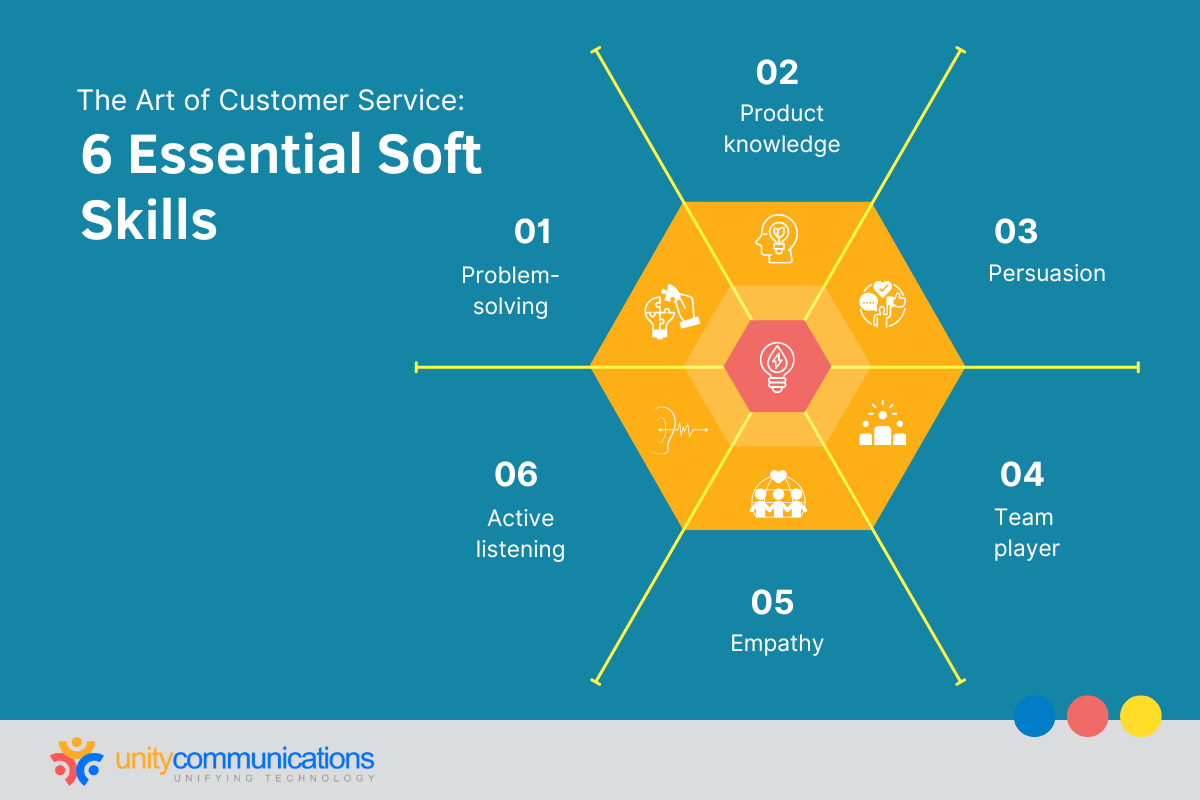Table of Contents
E-commerce customer service outsourcing entails hiring a third-party service provider to handle your online business customer, technical, and sales support.
This strategy lets you spend more resources on core activities such as developing better products and services, launching marketing campaigns, and growing your customer base.
But before outsourcing customer service, you must first understand how to get the best results for the least amount of money.
This article lists 18 customer service best practices for e-commerce outsourcing. Continue reading to get ideas for more effectively handling common business processes and situations.
E-commerce Customer Service Best Practices

Customer service best practices are not limited to protocols for customer service representatives (CSRs), technical support agents, or technologies. They also include strategies for managing your outsourcing engagement. Let us dive into the details.
1. Concentrate on Metrics That Matter
Keep a close eye on key performance indicators (KPIs) that point to high-quality customer service and satisfaction. Pick out and prioritize investing in the most relevant KPIs.
Here are some KPIs to emphasize:
- Average hold time (AHLDT) measures the time CSRs place callers on hold during an interaction. AHLDT must not be over two minutes (120 seconds) per call.
- Agent schedule adherence indicates whether agents follow their assigned schedules. A low rate means weak customer service.
- First call resolution (FCR) gauges a CSR’s ability to resolve customer concerns during the initial contact. Ideally, your FCR rate must be at least 70%, if it is to follow the call center industry’s benchmark.
- Average handle time (AHT) is the accepted period a CSR spends on a call to solve a customer’s issues. The industry average for an AHT is less than six minutes. Your representatives should aim for that.
- Abandon call rate (ACR) measures the number of times callers (typically due to frustration) hang up before CSRs can address their service or technical issues. Your team’s ACR must not exceed the industry standard of 8%.
2. Identify Objectives, Define Targets, and Monitor KPIs
The main goal when outsourcing customer service must be to consistently provide top-notch consumer satisfaction and experience. Outsourcing must contribute substantially to the company’s revenue.
To realize this, you must:
- Establish clear-cut, measurable, and reasonable benchmarks. Determine your team’s top targets and set specific timeframes to achieve them. For instance, aim to achieve >2% on ACR, +70% on FCR, and > 45 seconds on AHLDT within five working days.
- Monitor metrics. Closely watch the metrics you deem important to hit the targeted figures. Review all historical and real-time data. Then make a comparative analysis to evaluate the team’s progress and performance.
- Offer agents incentives. Conduct frequent meetings and huddles with team members to get work updates and increase motivation. When targets are accomplished, provide incentives or rewards to exceptional individuals or the whole team.
3. Consider the Team as a Revenue Generator
Treat the customer service team as a business segment that promotes your company’s income growth.
Customer service and technical support teams primarily assist customers and users with product or service issues. But they are also vital to strengthening, expanding, and maintaining brand loyalty and consumer retention.
High-quality service leads to high customer satisfaction. CSRs are more likely to convince happy callers to purchase products from your e-commerce store. Get your team members to look for ways to upsell or cross-sell when talking to a buyer.
Moreover, a skilled CSR team can encourage customers to return by always giving them a great buying journey. A solid business relationship with buyers leads to more repeat business and free promotion through word of mouth.
4. Reduce Operating Costs
Customer service costs include salaries, overtime pay, phone calls, and hardware. Below are some tips for reducing costs without compromising quality or agent productivity:
- Improve self-service options. Regularly update your frequently asked questions (FAQs) page and knowledge bases. Drive website traffic to these pages. When more customers visit and use these resources, you reduce human-agent interactions and lower call costs.
- Reduce staff turnover. Job postings, third-party recruiters, hiring, and onboarding are costly. Strive to keep top agents to avoid the extra costs of recruitment and boost team potential.
- Take advantage of non-phone communication channels. Increase consumer interaction via email support, live chat, and social media. These methods are cheaper than phone calls for answering customer questions.
- Improve FCR. Encourage CSRs to resolve customer issues on the first phone call. Your per-minute call costs will drop if FCR improves.
5. Gain a Business Edge With Strong Customer Service
One of the best ways to provide good customer service is to stress how vital the CSR team is to business competitiveness.
Staying ahead of the competition is necessary to survive and prosper. A strong competitive advantage enables you to:
- Increase agent productivity and efficiency
- Improve and streamline processes such as inventory management
- Adjust to customer requirements and needs promptly
- Build and maintain customer retention
- Sustain and accelerate income growth
Here are some ways to get a competitive edge with customer service:
- Provide full service. Provide omnichannel support to meet customers on every communication platform. Round-the-clock operations and multilingual capabilities are also recommended to serve international markets 24/7.
- Upskill your team. Use various training procedures and techniques, including live call testing, online and classroom lessons, training sessions abroad, and mentoring to take CSR skills to the next level.
- Implement customer-centric policies. Your strategies and decisions must revolve around customer experience and satisfaction. Building, increasing, and sustaining excellent services must be your primary focus.
6. Attend Customer Service Conferences and Conventions
By attending big events in your area and worldwide, you can share information and knowledge with other customer service professionals, leaders, and experts. You learn about the latest developments, technologies, and strategies in the industry.
To make the most of an event, follow these recommendations:
- Bring the team with you. If possible, require CSR attendance. You increase the likelihood of finding business opportunities with more attendees. Assign team members to participate in specific available sessions or workshops to network and learn.
- Search for prospective partners. Look for colleagues and leads relevant to your specialty. Whenever possible, join all the event’s activities from the first to the last day to expand your business network.
- Gain insight from new people. Grab this opportunity to connect with subject-matter experts to help address your customer service concerns. Some of these professionals give advice or consulting services for free to promote themselves.

7. Invest in Advanced Technologies and Tools
Access to the latest technologies can make or break your customer service operations.
New apps and platforms enhance e-commerce, making it accessible and customer-friendly while reducing costs over the long run. They allow agents and customers to communicate better and resolve matters as quickly as possible.
The following are some emerging technologies to acquire:
- Cloud networks allow remote or over-the-cloud access to all software and tools used in customer service.
- Omnichannel covers all the communication channels consumers use. This must-have solution integrates phone calls, social media, email, and chat into a single platform.
- Cybersecurity is an advanced method of safeguarding software, hardware, and data systems from breaches, theft, and scams.
- Artificial Intelligence (AI) emulates human intelligence in machines and devices. Integrating AI into the workflow boosts productivity cost-effectively.
- Robotic process automation (RPA) enables software robots to conduct particular assignments. RPA lets CSRs focus more on complex and critical tasks.
8. Offer CSRs a Promising Career
Keeping talented support agents is one way to ensure you are giving the best customer service. Many CSRs resign due to having limited career opportunities within a company. Boost retention by allowing CSRs to make full use of their skills and excel beyond their current roles.
Follow these tips to help CSRs design a long-term career path:
- Give rewards and incentives. Companies must generously compensate high performers and those who bring in revenue. They should also offer incentives to reliable and loyal agents.
- Designate challenging but doable tasks. Assign CSRs duties within their capabilities. Align additional responsibilities with their strengths and skills.
- Introduce a leadership training initiative. Provide leadership training to interested and deserving agents. This demonstrates your company’s seriousness about advancing qualified CSRs to managerial roles.
- Ask about their professional plans. Engage with CSRs and encourage them to share their long-term goals. Discover their career plans and how they see themselves in the organization in the foreseeable future.
9. Interact With Customers via Their Preferred Channels
Customers have preferred communication platforms based on their demographics. Belonging to a certain generation determines which channels they will likely use.
Thus, CSRs must prioritize covering the platforms their current and potential customers use. Here are a few guidelines to note:
- Live chat. Generation Z, born between 1997 and 2012, depends on this channel.
- Social media. Gen Z and millennials, born from 1981 to 1996, rely on these platforms.
- Phone calls. Baby boomers, born between 1946 and 1964, are heavy users of telephones or fixed phone lines.
- Email. Generation X, born from 1965 to 1985, and baby boomers regularly use this communication method.
- Messaging apps. Gen Z and millennials are common users of this system.
10. Serve Customers in the Shortest Possible Period
Customer service should strive to resolve problems as quickly as possible to save time, money, and effort.
Companies achieve better revenue, stronger brand loyalty, and business competitiveness with a fast response time. Swift and precise customer service operations reflect CSRs’ high efficiency.
To attain and maintain a fast response time, you must:
- Determine and enhance KPIs connected to response time. Identify which metrics reduce the time CSRs spend replying to customer concerns. Monitor these KPIs and help the team overcome the obstacles preventing them from serving customers quickly.
- Give more importance to live chats and chatbots. These communication channels enable agents to handle various chats simultaneously, serving more customers and decreasing overall wait time.
- Revitalize the team with the latest information. Keep CSRs updated with key product or service details so that they can answer customer questions quickly and accurately.
11. Promote Individualized Service
Customers have feelings. Unlike live CSRs, chatbots cannot understand and express emotions. Customers will likely be more loyal if agents show empathy and help solve their problems.
Here are ways to personalize customer service:
- Be a real person. Interact with consumers with sympathy, patience, politeness, and honesty to earn their trust.
- Talk shortly first about a light topic. Break the ice with polite small talk. Use this method to quickly establish rapport, but avoid lingering on unimportant topics.
- Ask for a review. Many customers like it when CSRs ask for feedback or comments on the service, product, or company.
- Call them by their first names. Interacting with customers on a first-name basis makes them feel at ease. Do this when writing an email, talking on the phone, or chatting with them on social media.
- Review customer conversation records. Check customers’ history, including their previous interactions, inquiries, and purchases, to offer a more individualized approach during calls.
12. Execute a Solid Training Course
An effective way to maximize customer service is by training CSRs to achieve their highest potential. Both new hires and long-term agents need ongoing skill development.
Your top agents must be available to train others. New employees feel more comfortable training under them than with outside experts. In addition, in-house training creates an environment where everyone can freely ask work-related questions and share experiences.
Consider the following tips to better instruct your team:
- Simulate situations. Hone agents’ competency by roleplaying the toughest customer problems they can encounter. Provide them with real-life cases that call for correct and acceptable solutions.
- Pair new agents with veterans. Job shadowing is a proven technique for accelerating the learning period of new hires and underperformers.
- Never say no. Instill in every team member the importance of giving customers positive answers regardless of their requests. Encourage them to be creative but honest in their replies.
13. Harness Customer Service Data
Customer analytics and business instincts improve decision-making. When numbers and data support management experience, you reduce guesswork and speculation.
By capitalizing on customer data analytics, you can:
- Identify channels’ effectiveness. Discover which communication modes are commonly or seldom used by your customers. As a result, you will know which channels to remove or spend your resources on.
- Watch agent output. Monitor high-performing CSRs so that you can reward them accordingly. You can also use data to determine underperformers and offer them more training.
- Discover recurring problems. Data helps you root out persistent challenges in the customer journey. For example, if analytics tells you that certain online shoppers complain about late delivery, you likely have a logistics issue.
- Process customer behavior. Collect and analyze consumer feedback, suggestions, preferences, and dislikes. You can more confidently handle situations that arise by having deeper insights from buyer perspectives.

14. Hire the Right CSRs
Recruit agents with above-average technical and soft skills. Acquire agents with certifications when possible or if necessary.
For soft skills, choose agents with the following traits:
- Problem-solving. Specialists must quickly spot the main cause of a customer’s concerns. They must deliver timely and satisfying solutions.
- Product knowledge. Agents must adequately answer inquiries regarding your services, products, and organization.
- Persuasion. CSRs must sway consumers to buy products or give favorable comments.
- Team player. Agents must be collaborative and willing to help members reach individual and team objectives.
- Empathy. Support agents must emotionally connect with customers’ good or bad experiences.
- Active listening. Specialists must remember and understand the details that callers share.
15. Build Your Dream Team
When outsourcing customer support, form a team that will run like a well-oiled machine. Check out these tips:
- Encourage transparency and collaboration. Promote teamwork, openness, patience, equality, and cooperation. Encourage members to develop seamless and efficient workflow. These qualities help keep team morale high.
- Choose the best tools and equipment. Equip your CSRs with relevant applications and devices to assist them in communicating with customers and accomplishing their daily tasks.
- Hire the most qualified people. Balance your team with seasoned specialists and enthusiastic new hires to form a dynamic, flexible, and well-rounded unit. Veteran agents are creative and can work calmly in difficult situations. Newcomers are eager, trainable, active, and ready.
- Decide on the right team size. Your team must have a supervisor or team leader, specialists, and representatives. You must also have an outside expert help your CSRs with tough issues during busy periods. At least three members of the team must be top performers.
16. Adopt International Coverage
Expanding into new international markets is an excellent customer service strategy. Grow your business with omnichannel, 24/7, multilingual customer support.
When establishing operations abroad, you gain the following benefits:
- Higher-income potential. When a business reaches its peak in the local market, going global is the next step for growth. You can tap into more consumers and increase sales when you expand internationally.
- Better protection from domestic recession. Your business can survive and prosper when local sales are slow, thanks to overseas expansion. International sales offset losses incurred in the domestic market. More markets in different locations mean your financial risks are spread out.
- More access to a diverse workforce. Remote hiring is more efficient because it can tap into diverse talent pools. More choices for talent result in substantial cost savings. Certain countries provide foreign businesses with qualified, educated, and trainable talent at a significantly lower cost.
17. Guarantee Data Security and Protection
Protect sensitive consumer data with advanced cybersecurity technologies. Cybersecurity is vital whether you outsource data entry services or technical support.
Your customer service operations must have high-level security and privacy policies in place to protect important personal information, such as:
- Bank account numbers
- Residential addresses
- Credit card details
- Insurance information
- Medical records
- Payroll, compensation, and salaries
- Investment accounts
- Passwords and usernames
Data breaches and cyberattacks can damage your company’s reputation. Thus, you need strict privacy and security measures. Get a non-disclosure agreement from third-party vendors to protect your data. Be clear that CSRs need permission to use customer data.
Data security must follow federal and industry regulations. These standards protect consumer data from unauthorized use. Failure to comply leads to legal consequences that damage your finances, operations, and reputation.
18. Fortify Agent Capabilities With Self-service Options
Self-service features enhance CSR efforts. Although smart software helps, it can never replace humans.
Customers will always be real people who like to talk. CSRs can focus on complex consumer issues using self-service options for common tasks and questions.
Note that cost-effective self-service options must be used:
- For simple or routine customer-related tasks
- To inform the public about your products and services
- During peak periods, so live agents can route customers to these technologies
Self-service options consist of the following:
- Product or service tutorials
- AI-powered chat and messaging
- Online support forum
- Online knowledge base
- Chatbots and virtual assistants
- FAQ page
- Video tutorials
Ensure self-service options are easy to use and answer common questions. Fill self-service resources with clear, concise, simple, and up-to-date information to encourage repeat customers.
The Bottom Line
Learning about customer service best practices helps you maximize this department’s benefits. Following these 18 points makes it easier to meet various goals such as cost reduction, productivity, revenue, or market reach. This guide’s tips can help supplement your business process outsourcing strategy.
So what should be your next step? Connect with competent BPO companies that can guide your outsourcing journey. Contact Unity Communications now!




